| کد مقاله | کد نشریه | سال انتشار | مقاله انگلیسی | نسخه تمام متن |
|---|---|---|---|---|
| 6544791 | 1421649 | 2018 | 12 صفحه PDF | دانلود رایگان |
عنوان انگلیسی مقاله ISI
Network governance in national Swiss forest policy: Balancing effectiveness and legitimacy
ترجمه فارسی عنوان
نظارت بر شبکه در سیاست ملی جنگل سوئیس: تعادل اثربخشی و مشروعیت
دانلود مقاله + سفارش ترجمه
دانلود مقاله ISI انگلیسی
رایگان برای ایرانیان
کلمات کلیدی
برنامه ملی جنگل، شرکت مشارکت کننده، شبکه های سیاست دولتی محور تجزیه و تحلیل متقابل، تجزیه و تحلیل شبکه شبکه،
ترجمه چکیده
حکومتداری شبکه ممکن است توازنی بین مشارکت دموکراتیک (مشروعیت ورودی) و کارایی و اثربخشی (خروجی مشروعیت) فرآیندهای سیاست را ایجاد کند و بنابراین می تواند پذیرش اصلاحات سیاسی را افزایش دهد. این مقاله با هدف کشف ساختار فعلی خود و توصیف تجربیات درمورد مشروعیت و در مورد چگونگی این درک توسط بازیگران درگیر در ارزیابی مدیریت شبکه در سیاست جنگل سوئیس است. اگر چه نظارت بر شبکه در سوئیس رایج است، به عنوان هماهنگی اولیه ذینفعان به دلیل نقاط ضعف وتوی بعد در روند سیاسی، روشهای مشارکتی پیشرفته تر به تازگی برای این شبکه ها معرفی شده است. بر اساس مصاحبه های متخصص و تجزیه و تحلیل شبکه های اجتماعی که مشتق از یک نظرسنجی آنلاین است، ما تأیید می کنیم که هسته شبکه سیاست های جنگل سوئیس شامل تنها تعداد انگشت شماری از بازیگران است. این بازیگران نسبت به رویکرد فعلی نسبتا راضی هستند و برخی از آنها تقویت بیشتر عناصر مشارکتی را از بین می برند. به خصوص جنگل های اقتصادی و همچنین بازیگران نمایندگی از حوزه های قضایی فرعی (کانتون ها) به خوبی با دیگر بازیگران صنایع جنگل ارتباط برقرار می کنند، اما در عین حال نفوذ خود را درک نمی کنند. در مقابل، سازمان های غیردولتی محیط زیست، نفوذ خود را به طور مثبت قضاوت می کنند، هرچند اغلب با یکدیگر و با اداره ملی هماهنگ می شوند. با وجودی که شبکه ها در زمان تجزیه و تحلیل بسیار نزدیک به بازیگران قانونی نیستند، احتمالا به دلیل اصلاح سیاست های جنگل، سؤال های اساسی را حل کرده اند، اما شبکه سیاست های جنگل به خوبی در فرایند دموکراتیک قرار دارد.
موضوعات مرتبط
علوم زیستی و بیوفناوری
علوم کشاورزی و بیولوژیک
جنگلداری
چکیده انگلیسی
Network governance may strike a balance between democratic participation (input-legitimacy) and efficiency and effectiveness (output-legitimacy) of policy processes and thus can enhance the acceptance of policy reforms. This article aims at an appraisal of network governance in Swiss forest policy by uncovering its current structure and by describing the experiences in terms of legitimacy and concerning how this is perceived by the actors involved. Although network governance is common in Switzerland, as an early coordination of stakeholders is required due to strong veto points later in the political process, more progressive participatory procedures have recently been introduced to these networks. Based on expert interviews and a social network analysis derived from an online survey, we confirm that the core of the Swiss forest policy network includes only a handful of actors. These actors are relatively satisfied with the current approach and some of them decline a further strengthening of participatory elements. Particularly the forest economic as well as the actors representing the sub-national jurisdictions (cantons) are well connected with other actors from forest industry, but still they perceive their influence as not being adequate. The environmental NGOs, in contrast, judge their influence more positively, albeit they coordinate mostly with each other and with the national administration. Although the networks do not engage legislative actors very closely at the time of analysis, probably because forest policy reform has already settled the more fundamental questions, the forest policy network nonetheless seems well embedded in the democratic process.
ناشر
Database: Elsevier - ScienceDirect (ساینس دایرکت)
Journal: Forest Policy and Economics - Volume 89, April 2018, Pages 42-53
Journal: Forest Policy and Economics - Volume 89, April 2018, Pages 42-53
نویسندگان
Tobias Schulz, Eva Lieberherr, Astrid Zabel,
